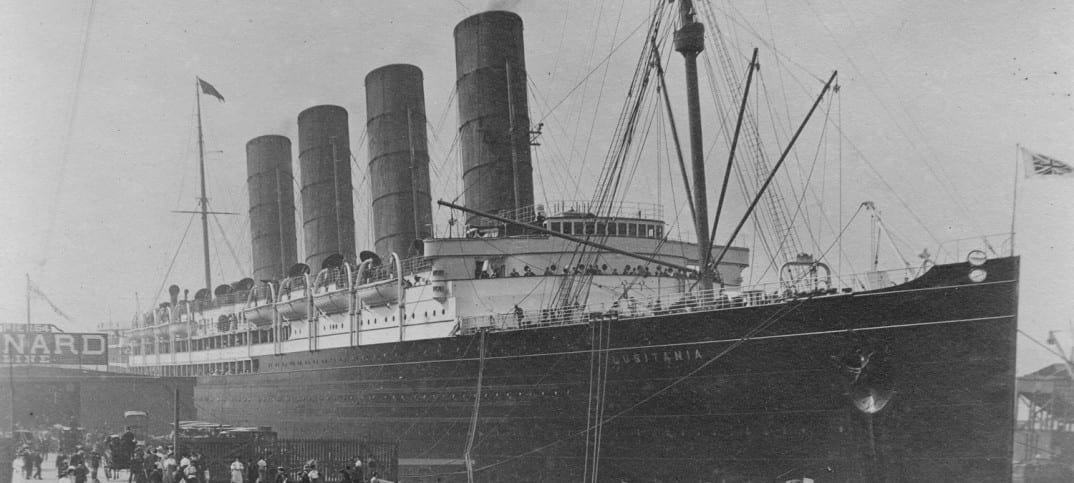Nancy Dorney will spend several hours at Pier A in New York City on May 7 honoring relatives she never met.
A retired shop owner from Stony Brook, Dorney will join officials from Great Britain, Ireland, Germany and other countries to pay tribute to those who took a journey that ended abruptly and in many cases tragically exactly 100 years earlier when a German submarine torpedoed and sank the British ship Lusitania off the coast of Ireland as it was heading for Liverpool.
Among the 1,198 killed that afternoon were 128 Americans, which included 39-year-old pianist Charles Harwood Knight and his 42-year-old sister Elaine. The Knights were Dorney’s great-great-uncle and aunt and, for a time, were also her grandmother Millicent Lawrence’s guardians. After the sinking, which took 18 minutes, the Knights, who were traveling in first class, were never found.
The Knights “disappeared off the face of the Earth because they decided to take the ship that day,” Dorney said.
The sinking of the Lusitania, like the loss of the Titanic three years earlier, raised questions about what actions could have prevented the death of so many at sea. It also triggered active discussion about what role the United States could or should play in World War I.
The German government had warned of an aggressive campaign to sink ships around the British Isles that they believed were carrying munitions and reinforcements for the war. Some thought the Lusitania, which, at 24 knots, was the fastest cruise ship active at the time, could avoid becoming a target. The ship, however, had shut down one of its boilers to keep down costs, bringing its top speed to 21 knots, said Michael Poirier, co-author of the book “Into the Danger Zone: Sea Crossings of the First World War.” In the waters where the Germans had been patrolling, the ship was only going 18 knots, said Poirier.
The Lusitania “was handicapped by not speeding through the danger zone,” Poirier said. There are so many “what ifs,” he added.
In the aftermath of the sinking, opinions in the United States were sharply divided over the proper course of action. Secretary of State William Jennings Bryan, who had run for president three times and was an outspoken member of the Democratic Party, urged the country to steer clear of involvement.
Bryan thought the sinking didn’t immediately require farm boys from the middle of the country to risk being “killed for the rights of wealthy Americans to travel through war zones,” said Michael Barnhart, a distinguished teaching professor in the History Department at Stony Brook.
Even if America didn’t enter the war, Bryan didn’t want the sinking to become “a line in the sand,” where, if the Germans cross that line in the future, America “paints itself into a corner and has no option but to go to war,” Barnhart continued.
Teddy Roosevelt personified the other side of this argument, urging the United States to come to the aid of the British. Roosevelt viewed the sinking of the Lusitania “as an example of barbarism,” Barnhart said.
Political cartoonists at the time described the Germans in terms similar to the way people view ISIS now, Barnhart said.
Sensing that the country wasn’t eager to become involved in war, President Woodrow Wilson demanded that “Germans give the citizens of neutral nations a chance to get away in lifeboats before the ship on which they had been sailing was sunk by a German submarine,” explained Richard Striner, a professor of history at Washington College in Chestertown, Maryland. The Germans told Wilson the British had deck guns on their passenger ships that the British could use if the submarines surfaced. Wilson, Striner continued, suggested the British get rid of these guns but, not surprisingly, the British refused.
Ultimately, however, Wilson did what Bryan feared, indicating that future attacks would bring the country closer to war. In protest of the president’s posturing, Bryan resigned. In 1917, the Germans “realized that turning the U-boats loose would bring the U.S. into the war,” Barnhart said, but, they resumed their attacks anyway amid a shift in political winds in Germany. The United States joined the war on April 6, 1917.
As for Dorney, she has delved deeper into the lives of distant relatives who were important for her grandmother. Charles Knight, who people called by his middle name Harwood, was an accomplished pianist and, as Dorney described, a bit of a character. He forgot the organ music he was supposed to bring to a family funeral and played a somber version of a ragtime song from 1896, called “There’ll Be a Hot Time in the Old Town Tonight.”
The last anyone heard from the Knights was when they sent a note to Dorney’s grandmother that contained a list of first-class passengers aboard the Lusitania, with names including Alfred Vanderbilt and Charles Frohman. A theater producer, Frohman helped develop such stars as Ethel Barrymore and John Drew, relatives of current actress Drew Barrymore.
As the former owner of Pride’s Crossing, a housewares and furniture store in Stony Brook, Dorney said she has an appreciation for what she’s learned about the Lusitania. The woodwork on board was “beautifully made and included interior design and artwork that were magnificently done.”
Dorney and those attending the wreath-laying ceremony in New York will heed the words Poirier said are so often connected with the sinking of the Lusitania: “Lest we forget.”







